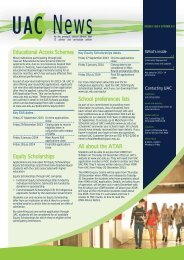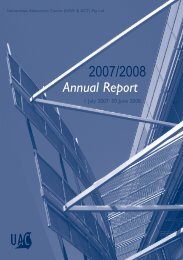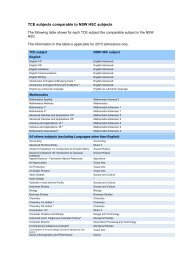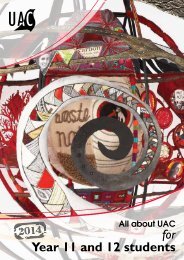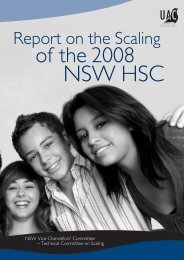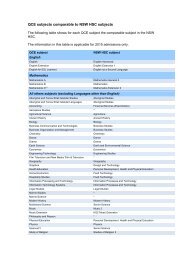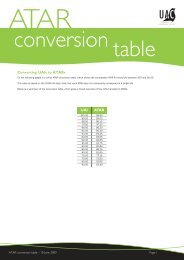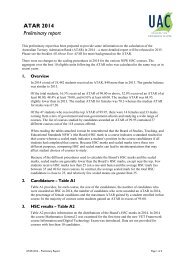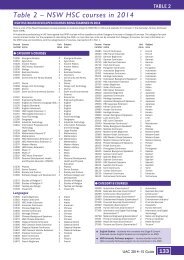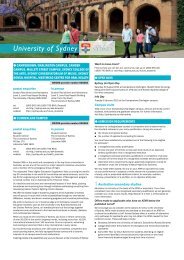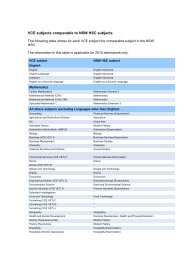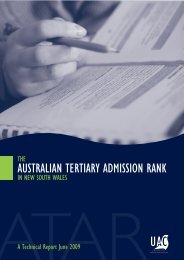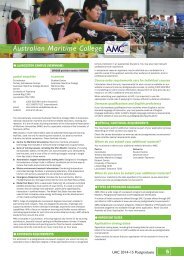Download - Universities Admissions Centre
Download - Universities Admissions Centre
Download - Universities Admissions Centre
Create successful ePaper yourself
Turn your PDF publications into a flip-book with our unique Google optimized e-Paper software.
GlossaryFollowing is a summary of terms generally used by the participating institutions. Take a few minutes to read thesedefinitions, as they will help you to understand the information provided in this booklet. These definitions areusually included in each institution’s calendar/handbook.Academic yearThe part of the year when students are enrolled intertiary study. The academic year normally commencesin February/March when classes begin, and ends withthe examination period in November/December. It maycomprise two semesters or three terms.Additional selection criteriaCompulsory requirements, either in addition to, orinstead of, normal entry requirements used byinstitutions for selection purposes for a particularcourse/s. For example, interviews, auditions, portfolios,supporting statements, questionnaires and tests.These requirements are listed as prerequisites (P) inthis booklet and applicants must satisfy theprerequisite/s to be eligible for selection.You should seek further information now as some ofthese require materials and evidence of experience, tobe compiled or documented during Years 11 and 12.Admission requirementsThe minimum qualifications required for you to beconsidered for entry to a particular course. Entry tomany courses is competitive, and the attainment ofthese minimum qualifications does not guarantee youwill be offered a place.Advanced diplomaAn award requiring two or three years full-time, orequivalent part-time, study.Areas of studyA general guide to the areas of study offered byinstitutions is provided in section 5 in the front ofthis booklet. Refer also to ‘Areas of study index’ afterthe Glossary.Associate degreeAn award requiring two years full-time or equivalent parttimetertiary study, which equates to the first two years of adesignated three-year degree course.Assumed knowledge (shown as A)A level of achievement in a specified course/sat the NSW HSC (or equivalent) considered desirablefor successful study in a tertiary course or first-yearsubject.If you do not have the assumed level of knowledge butdo have a suitable UAI you may still be selected for thecourse, but may be placed at a considerabledisadvantage.Some institutions offer bridging or introductory coursesto help you achieve the required level of assumedknowledge. However if you include one or more ofthese bridging courses in your program, it could preventyou from completing your tertiary course in theminimum time.Refer also to ‘How to read the institutions’ entries’ onpage 9.Bachelor degreeAn award requiring three or four years full-time, orequivalent part-time, or sandwich, study.Combined/double degreesCombined/double degrees allow students to completetwo degrees in less time than would be taken if the twodegrees are studied sequentially.DefermentPermission to delay the commencement of a course fora fixed period, usually one year.Some institutions only grant deferment in specialcircumstances.DiplomaAn award usually requiring two or three years full-time,or equivalent part-time, undergraduate study. Thesecourses are usually characterised by more emphasis onpractical skills than on the theoretical content requiredfor a degree.Distance educationA form of full-time or part-time study that takes placeoutside the tertiary institution, either at a study centreor at home by correspondence. Periodical residentialattendance at on-campus sessions is usually required.HSC subjects and coursesA subject is the general name given to an area of study.A course is a branch of study within a subject. A subjectmay have several courses. For example, within thesubject of English the courses include English (Standard),English (Advanced), HSC English Extension 1 and so on.Major studiesAreas of in-depth study or specialisation within acourse, consisting of a sequence of subjects/units ina single discipline generally studied throughout thecourse. Major studies comprise more subjects/unitsthan minor studies. In some courses it is possible tohave more than one major study.Some institutions may refer to major studies as majorsor specialisations.Glossary81



